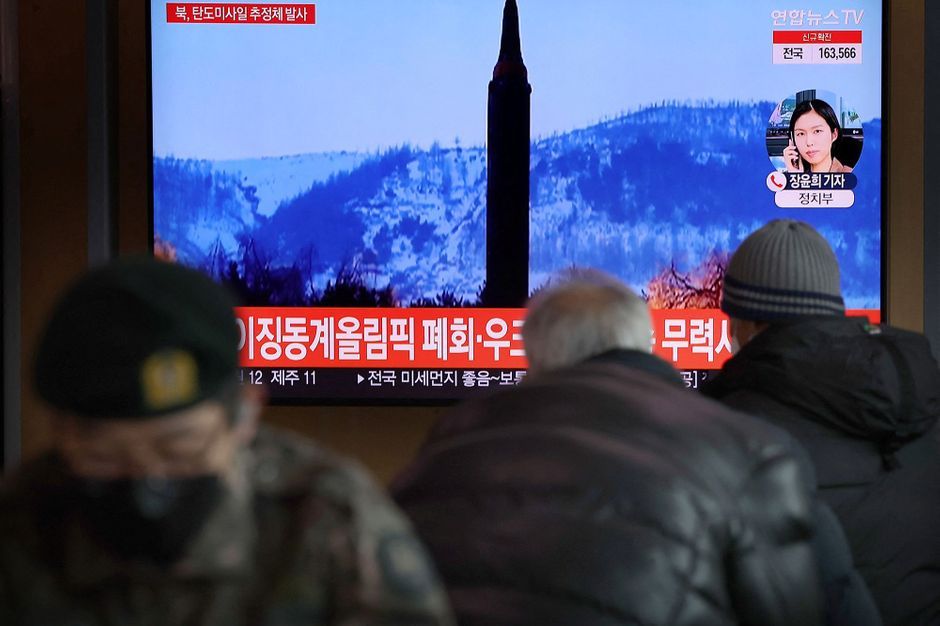A field war that is accompanied by an information war. As Russian and Ukrainian troops clash in the capital of Kiev, on the fourth day of the Russian invasion, Russia decided on Saturday to tighten the screws on the work of national media covering the conflict. A gesture illustrating the strong hold of the Kremlin on the country’s press, controlled as rigorously as opponents of the regime.
What are the Russian government’s orders to the press?
Russia’s media regulatory agency, Roskomnadzor, has ordered the country’s media to remove any remotely negative mention of Russian operations. Any reference to civilians killed by the Russian army, as well as the terms “invasion”, “offensive” or “declaration of war” are therefore prohibited by the authorities, who only want to hear about “operation special military force” intended for “peacekeeping”.
Do some media dare to challenge the government’s word?
Yes, like those who were notably targeted by Roskomnadzor’s formal notice, such as the Novaya Gazeta newspaper, whose editor-in-chief is the 2021 Nobel Peace Prize winner, the Dojd online channel or the Mediazona site, which are already classified as “foreign agents” in Russia. According to the regulator, these media are guilty of spreading false information by claiming that “Russian armed forces are firing on Ukrainian cities”. In the event of refusal to erase the content in question, “access to these media will be restricted”, warns Roskomnadzor, who also mentions heavy fines.
What are the Kremlin-linked media saying about the conflict?
Government-sanctioned media pick up on Vladimir Putin’s language, and are highly critical of the Ukrainian government and Western media “hysteria” over the invasion. No way for them to talk about war against Ukraine. Shortly before Thursday’s attack, the agency Associated Press saw several Russian TV channels describe Moscow’s intervention as saving and welcomed by the people of Donbass. And for good reason: they are victims of a “genocide”, denounced for example the star presenter Dmitri Kiselev on the channel Rossiya 24, of the state group VGTRK.
On Friday morning, the Perviy Kanal TV channel described the calm and tranquility of the streets of Kiev and Kharkiv, as Russian troops tried, not without difficulty, to storm the cities, says the Moscow Timesan independent English-language newspaper.
In France, the RT channel (formerly Russia Today, also belonging to VGTRK) gave pride of place to speakers defending Russian intervention. Thursday, Emmanuel Leroy, president of the 1717 institute which campaigns for “a new Franco-Russian alliance”, castigated the “illegitimate government” of Kiev and guaranteed that the goal of the Russians was “to put an end to the war”. The chain, subject to the rules imposed by Arcom in France, was subsequently called upon to be vigilant about its handling of the crisis.
How does information circulate on social networks?
Crucial ground in times of crisis, social networks are also in the crosshairs of the Russian authorities. On Friday, Facebook-owner Meta Group was ordered by Russian authorities to “stop fact-checking and reporting of content posted by four Russian state-controlled media outlets”, said its vice-president, Nick Clegg. Content moderation is a critical issue for the platform, often accused of promoting the spread of false information.
Meta refused to obey orders from Moscow. Consequence: access to the group’s services is limited by the Russian authorities. Meanwhile, Facebook said on Friday it had banned “Russian state media from running ads or monetizing on our platform anywhere in the world.” In short: the group wants to limit the impact of Russian propaganda outside the country.
For its part, Twitter, which was fined and whose service was slowed down after orders from Moscow to delete certain content, announced on Saturday that its network was “restricted for certain people in Russia”. And on Telegram, the disinformation war is raging: as the magazine points out Foreign Policymany channels relay pro-Russian propaganda messages en masse, denying the scale of the Kremlin’s attacks.
–


